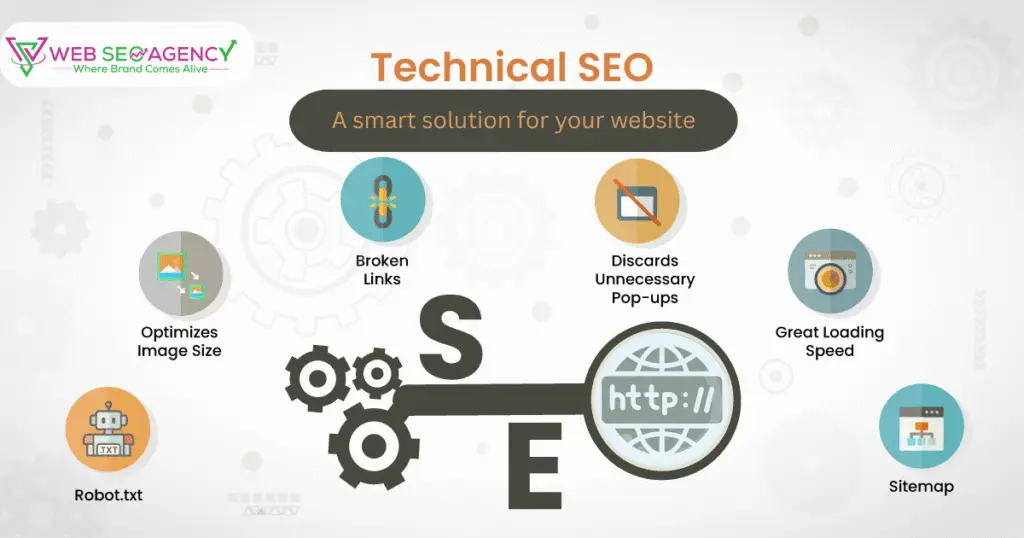
Technical SEO Services: The Complete Guide to Website Optimization
When it comes to digital marketing, most businesses talk about content creation and link building. While these two factors are important, they will not deliver results if your site lacks a strong technical foundation. This is where technical SEO services play a crucial role. Without fixing technical errors, improving site architecture, and optimizing crawlability, your online presence can remain invisible to search engines, no matter how great your content is.
In this guide, we’ll break down the essentials of technical SEO services, why they matter, how they work, and what businesses can expect when investing in them. This is a comprehensive resource for marketers, entrepreneurs, and website owners who want to strengthen their online performance.
What Are Technical SEO Services?
Technical SEO services encompass strategies and tasks designed to optimize the backend of your website, enabling search engines to crawl and index it effectively. Unlike content SEO, which focuses on keywords and writing, or off-page SEO, which involves backlinks, technical SEO ensures that your website is built on a solid foundation.
Some areas covered by technical SEO services include:
- Website speed optimization
- Mobile responsiveness
- SSL implementation (HTTPS)
- Crawlability and indexation improvements
- Fixing broken links and redirects
- Structured data (schema) integration
- Optimizing robots.txt and XML sitemaps
In simple terms, these services make sure that your website is search-engine friendly at its core, which leads to higher rankings, more traffic, and a better user experience.

Why Technical SEO Services Matter
Many businesses wonder why they should invest in backend optimization when they already publish content or run paid ads. The answer lies in how search engines operate. Google prioritizes websites that offer both great content and smooth technical performance.
Here are a few reasons why technical SEO services are essential:
- Better Crawlability and Indexing – If search engines can’t properly crawl your site, important pages might not appear in results.
- Improved User Experience – A fast, secure, and mobile-friendly website encourages users to stay longer and engage more.
- Higher Rankings – Technical elements like Core Web Vitals, site speed, and HTTPS directly influence search engine rankings.
- Reduced Bounce Rate – When users find your site easy to navigate, they are less likely to leave quickly.
5. Future-Proofing – With frequent algorithm changes, professional technical SEO services help keep your website updated and compliant.

Key Components of Technical SEO Services
Technical SEO covers a wide range of elements. Below are the most important areas every business should pay attention to.
1. Website Crawling and Indexing
Crawlers are bots used by search engines to discover and index content. If these crawlers can’t access your site efficiently, your pages won’t rank. Professional technical SEO services ensure that robots.txt files, XML sitemaps, and site architecture are all optimized for proper crawling.
2. Site Speed Optimization
Online users are used to speed, and anything slower than three seconds feels frustrating. Slow websites frustrate visitors and lead to ranking drops. Optimizations include compressing images, reducing CSS and JavaScript bloat, and leveraging caching. Site speed improvements are a core part of technical SEO services.
3. Mobile Optimization
With Google’s mobile-first indexing, mobile performance directly impacts rankings. Technical SEO ensures that your site works smoothly on smartphones, tablets, and all screen sizes.
4. Secure Sockets Layer (SSL)
Security is a ranking factor. If your website doesn’t use HTTPS, users may see warnings. Implementing SSL certificates is one of the simplest but most important technical SEO services.
5. URL Structure and Internal Linking
Clean, keyword-rich URLs and a strong linking structure help both users and search engines understand site hierarchy. Internal linking also distributes authority across pages.
6. XML Sitemaps
An XML sitemap provides search engines with a roadmap of your website. Optimized sitemaps highlight important pages and exclude duplicate or low-value URLs. This is a standard service included in professional technical SEO services.
7. Robots.txt Optimization
Your robots.txt file controls crawler access. Technical SEO ensures it is configured correctly to block irrelevant content while allowing bots to access important pages.
8. Canonical Tags
Duplicate content can confuse search engines. Canonical tags help identify the preferred version of a page. This prevents content cannibalization and improves ranking signals.
9. Structured Data (Schema Markup)
Schema helps search engines better understand your content. With structured data, your website can appear in rich snippets, FAQs, and other enhanced search results. This is an advanced but highly valuable part of technical SEO services.
10. Fixing Duplicate Content
Duplicate pages harm SEO by splitting ranking power. Technical fixes such as redirects, canonicalization, and meta tags eliminate this issue.
11. Redirect Management
Redirects are necessary during site migrations or when pages are deleted. However, improper redirect chains can slow down websites and harm rankings. Effective redirect management is included in it..
12. Core Web Vitals Optimization
Google now looks at Core Web Vitals when deciding how high your site should rank. These metrics measure load speed, interactivity, and visual stability. Optimizing them ensures that your website is both user-friendly and search engine-friendly.
13. Error and Broken Link Fixes
404 errors, server issues, and broken internal/external links create poor user experiences. Technical SEO audits detect and fix these problems to keep your site healthy.
Benefits of Technical SEO Services
Businesses that invest in it gain a competitive advantage online. Key benefits include:
- Higher visibility in search results
- Faster site performance
- Stronger website security
- Improved mobile user experience
- Lower bounce rates and longer sessions
- Greater crawl efficiency for search engines
- Better conversion rates due to smoother navigation
These benefits combine to create a sustainable growth path for any online business.
Technical SEO vs. On-Page SEO vs. Off-Page SEO
To fully understand SEO, it’s important to distinguish between its three main branches:
- Technical SEO Services – Focus on site infrastructure, performance, and crawlability.
- On-Page SEO – Involves content, meta descriptions, headers, and keyword optimization.
- Off-Page SEO – Includes backlinks, social signals, and brand mentions.
Together, these three areas create a balanced and effective SEO strategy. Ignoring one weakens the others.
Technical SEO Audit: Step-by-Step
A technical SEO audit is a process of evaluating your website’s health. A standard audit includes:
- Running a site crawl to detect issues
- Checking indexing status in Google Search Console
- Testing site speed and Core Web Vitals
- Reviewing robots.txt and XML sitemaps
- Fixing broken links and redirects
- Ensuring mobile compatibility
- Implementing schema markup
- Removing duplicate content
A professional provider typically conducts an audit before implementing any fixes.

Tools Used in Technical SEO Services
Professionals rely on specialized tools to perform detailed audits and improvements. Some of the most popular include:
- Google Search Console
- Google PageSpeed Insights
- Screaming Frog SEO Spider
- GTmetrix
- SEMrush Site Audit
- Ahrefs Site Explorer
- Moz Pro
- Yoast SEO (for WordPress sites)
These tools help identify issues and track progress over time.
Common Mistakes in Technical SEO
Many websites suffer from technical problems without realizing it. Here are the most frequent mistakes:
- Slow site loading speeds
- Poor mobile responsiveness
- Incorrect robots.txt settings
- Duplicate or thin content
- Missing or incorrect canonical tags
- Broken internal/external links
- Not using HTTPS
- Unoptimized URL structures
Avoiding these mistakes is part of any effective strategy.
Choosing the Right Technical SEO Service Provider
Not all agencies are equal. When choosing a provider, consider the following:
- Experience and proven case studies
- Transparency in reporting
- Use of advanced tools
- Customized strategies for your website
- Affordable but realistic pricing
A trusted partner for it should prioritize long-term success over quick fixes.
Technical SEO Services Pricing
Pricing varies based on site size and complexity:
- Small websites: $500 – $1,500 per month
- Medium-sized businesses: $1,500 – $5,000 per month
- Enterprise websites: $5,000+ per month
One-time audits are usually cheaper, but ongoing services provide better results since SEO is not a one-time task.
Future of Technical SEO
As technology evolves, the future will adapt as well. Emerging trends include:
- AI-driven search algorithms
- Voice search optimization
- Stricter Core Web Vitals requirements
- Greater focus on mobile-first indexing
- More advanced schema implementations
Businesses that keep up with these changes will remain competitive in the digital landscape.
FAQs About Technical SEO Services
1. How soon will I start seeing results from technical SEO work?
Most websites see results within 3–6 months after implementing technical improvements.
2. Do small businesses need technical SEO?
Yes, even small sites benefit from improved speed, security, and visibility.
3. Can I do technical SEO myself?
Basic fixes can be DIY, but professional technical SEO services deliver more effective and long-term results.
4. Is technical SEO a one-time process?
No. Ongoing monitoring is necessary to keep up with algorithm updates and technical changes.
5. What’s the difference between a technical SEO audit and a full SEO audit?
A technical audit focuses on performance and crawlability, while a full audit includes content and backlink analysis.
Conclusion
In today’s competitive digital world, success depends on more than just content and links. Your website needs a solid technical foundation to perform at its best. Professionalism ensures that your site is fast, secure, mobile-friendly, and optimized for search engines.
By investing in these services, businesses gain higher rankings, better user experiences, and long-term growth potential. Whether you’re a small business or a large enterprise, technical SEO is no longer optional—it’s essential for survival and success online.





